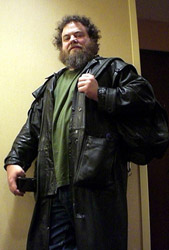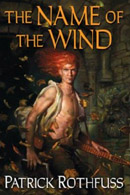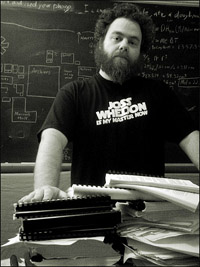
ShadowDance: What do you think of the recent "new wave" of Fantasy, heralded by names like Scott Lynch, R. Scott Bakker, Stephen Erikson, Hal Duncan, Susanna Clarke, Naomi Novik, Brandon Sanderson, Joe Abercrombie and yourself? Do you think the genre is finally moving away from the cliches most people associate it with?
Patrick Rothfuss: I think the readers are eager to read good stories that aren't just rehashes of the same old thing. The publishers are realizing this, and so we're seeing more books that depart from some of the classic fantasy tropes.
SD: Does blogging and visiting fansites influence your creative abilities or your habits?
PR: Not really. I've written a satirical humor column for the local paper for the last ten years, so for me blogging is pretty much just doing the same thing, except now I put it online so my fans can read it.
SD: You've mentioned before that you are a "science geek". Have you ever thought about writing Science Fiction after you finish The Kingkiller Chronicle?
PR: Some people have referred to my story as "Science Fantasy" because I strive for realism, and one of my magic systems has a very logical framework that's based on thermodynamics.
That said, Science fiction doesn't really call to me that much. Most of the ideas I have for future stories are one type of fantasy or another. Fantasy is where my heart lies.
SD: Which period of SF's history do you consider the most successful and important – the Golden Age (the 40's & 50's), the New Wave, the 80's cyberpunk, contemporary fiction? Or any other?
PR: I don't know about most successful or important, but I have a real fondness for cyberpunk if it's done well.
SD: Do you think Fantasy has evolved enough to be divided into such periods?
PR: It's not a lack of evolution that keeps fantasy from being divided into periods like that. The only reason that works so well for science fiction is because that genre tends to linked very closely to the technology of the day. So what's believable and interesting to the reading public tends to c
 hange from decade to decade. Fantasy has more freedom that that.
hange from decade to decade. Fantasy has more freedom that that.SD: The Name of the Wind has done extremely well sales-wise. Why then do you think you had such a hard time finding a publisher for the book?
PR: The book had a lot of things working against it. I was an unknown author, and the book was really long. That means that it's more work for an editor to read, and more expensive for a publisher to produce.
But the main reason I think I had a hard time finding a publisher was that I didn't really know how to write a good query letter. I'm not very good at pitching the book. 9 times out of ten the book was rejected by someone who hadn't read anything but a query letter.
SD: Have you ever imagined a future movie adaptation of The Name of the Wind?
PR: Of course. I think all writers do, even if it's just a daydream.
SD: Do you think it is even possible for the book to be adapted for the big screen?
PR: Possible, but tricky. In this first book there aren't any swordfights, goblin armies, or big impressive magics. Those things obviously aren't necessary for a good story, but to date, most fantasy movies have been big-budget action-adventure extravaganzas. That sort of treatment won't work for my story. My story is interesting for reasons other than special effects, so those are where the focus would need to be.
SD: You've said your strongest side is "brevity". Which is your weakest one then?
PR: Plotting, probably. I've come to the realization that I don't think of plot the same way as most other writers. I don't understand the stereotypical Hollywood three-act structure that everyone else seems to familiar with.
Then again, I'm pretty happy not knowing. I think that's another thing that helps make my stories different.
SD: What do you think of writing workshops?
PR: They can be useful, depending on who is involved, but they really aren't necessary. The most important thing about learning how to write is writing, and thinking critically about writing. Everything else is just a matter of personal preference.
SD: Do you feel that active communication with other authors is productive for your writing, and do you think there is a place for solitary geniuses nowadays?
PR: I enjoy talking with other authors, but I don't know if it really helps my writing. So yeah, solitary genius is still in.
Talking with other writers *certainly* has helped my understanding of the publishing world though. It's been invaluable for that.
SD: If you could write any other famous SFF book, written in recent years, which one would it be and what would you have changed in it?
PR: I never really think, "I wish I could have written that book." Because I know that it would just be impossible. Sometimes I think, "I wish I could write a book as good as this." That happened just recently with Terry Pratchett's Nation.
SD: What do you think about the fanfics flooding the internet? Do you consider them a mockery of an author's work, or a way for a person to express their love for a certain book?
PR: I think they come from a loving place. No matter how an author feels about it, you have to admit that fanfic comes from people loving your characters and the world you've created. People rarely write fanfic about books they hate….
SD: Would you be flattered or insulted to find a fanfic based on your own works?
PR: There have already been a few. I've been flattered. I think it's cool.
Then again, the ones I read were pretty well done. They weren't like Star Trek/Name of the Wind crossover slashfic or anything like that. I might feel differently in that case.

SD: Do you think that the settled and secure life that most contemporary writers live weakens their ability to write dynamic stories? Is it necessary for a person to have lived through a real adventure, to be able to describe one convincingly?
PR: No. Not at all. It's an understandable thing for people to think, but when you really stop to consider, it's just ridiculous. Does that mean people have to be able to do magic to write about it? Do you need to live in 1943 to write about WWII? Do you need to be a serial killer in order to write a story about one?
No, of course not. That goes against the whole nature of speculative fiction. Speculative fiction writers ask, "What if…." Then we make up answers and turn them into stories.
SD: You've said your favorite SF story is Firefly. Why is that?
PR: What's not to like? You've got everything you could ever want in a story right there.
SD: Are you familiar with all of Joss Whedon's work?
PR: Oh hell yes.
SD: What do you think of his other TV series or comic books?
PR: Brilliant across the board.
SD: And most importantly – where can one find THAT T-shirt?!!!
PR: They sell them over at one of my favorite web comics: PVP. It's a reference to this strip.
http://www.pvponline.com/2005/05/10/tue-may-10/
SD: Could you share an advice you think important for aspiring authors (apart from "work hard and don't give up")?
PR: Practice your signature now. If you don't, you'll end up with a lame signature like mine, and everyone will make fun of you when you sign autographs.
SD: Thank you very much for this interview, Mr. Rotfuss!
No comments:
Post a Comment